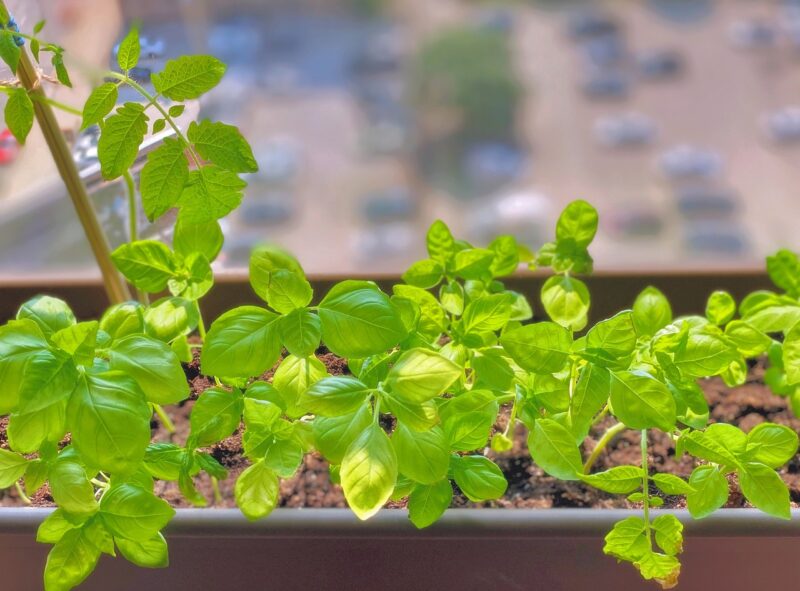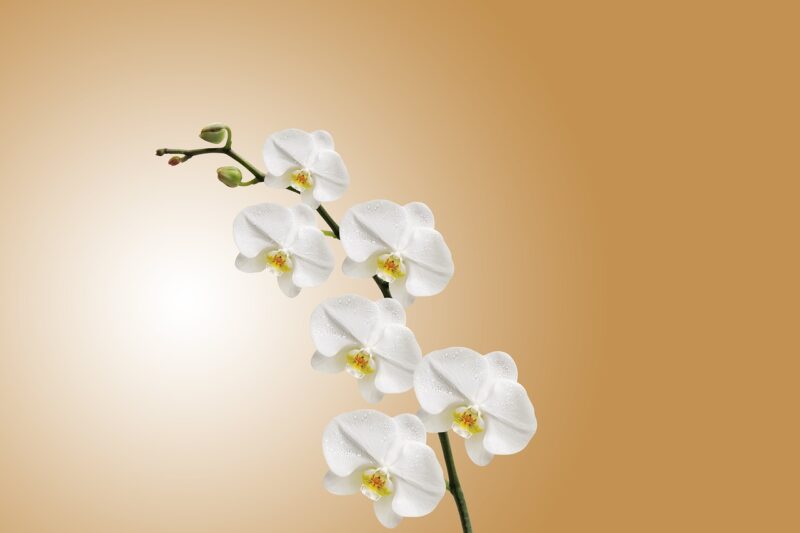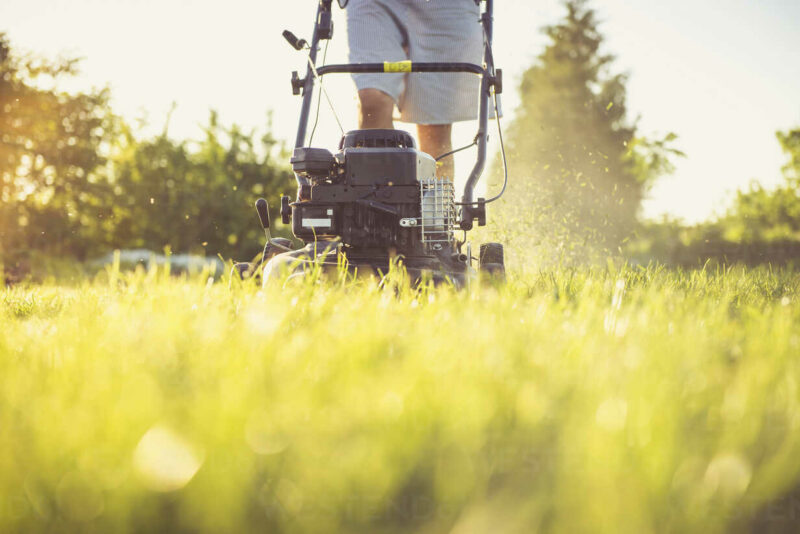
Feeling down during the winter months? Don’t worry, there’s a solution! Why not bring some greenery and life into your home with the best indoor herbs for winter? Basil, chives, oregano, parsley, thyme – these plants can all be grown indoors with just soil, water and a sunny window. So, keep the winter blues at bay and try your hand at indoor gardening.
Best Indoor Herbs for Winter
Winter can be a difficult time for herb lovers. The cold weather and lack of sunlight can make it tough to grow herbs outside. Luckily, there are several indoor herbs that can thrive during the winter months. Here are the best indoor herbs for winter.
Basil
Basil is one of the best indoor herbs for winter that you can easily grow in your home. It’s a versatile herb that can be used in a variety of dishes, including Italian and Thai cuisine. Plus, it has a lovely aroma that can lift your mood and help you combat the winter blues. Basil is also a great source of nutrients, including vitamin C, calcium, and iron.
It’s easy to grow basil in a pot, either from seed or from a young plant. Just make sure to keep the soil moist but not waterlogged, and provide plenty of sunlight. You can also pinch off the leaves as needed for cooking or drying. With basil in your indoor herb garden, you’ll have fresh, flavorful herbs all winter long.
Rosemary
Rosemary is another great indoor herb for beating the winter blues. Its piney scent can instantly uplift your mood and help you feel more energized. Not only is rosemary a flavorful addition to many winter dishes, but it also has a variety of health benefits. It is known to improve memory and concentration, relieve stress, and boost the immune system.
Rosemary is also easy to care for and can thrive in a sunny indoor spot with well-draining soil. Regular pruning will help to keep it bushy and promote new growth. With its versatility and numerous benefits, rosemary is a must-have herb for any indoor herb garden during the winter months.
Mint
Mint is definitely one of the best indoor herbs for winter as it is easy to grow and adds a fresh flavor to any dish. Not only is it a great addition to teas, but it also pairs well with savory dishes like lamb and potatoes. Plus, its scent is known to have a calming effect on the mind and body, which can be particularly helpful during the colder months when we tend to spend more time indoors.
To ensure your mint plant thrives, make sure to give it plenty of sunlight and water. It’s also a good idea to trim it regularly to encourage new growth. With just a little bit of care, you can have fresh, home-grown mint all winter long to brighten up your meals and your mood.
Sage
Sage is a versatile herb that adds a distinctive flavor to various culinary dishes. With its earthy and slightly peppery taste, sage is a wonderful addition to winter recipes, such as hearty stews and roasted meats.
When cultivating sage indoors during winter, provide it with a well-draining soil mix and ensure it receives ample sunlight. Sage is a hardy herb that can withstand colder temperatures, making it an excellent choice for your indoor herb garden. Consider drying sage leaves for long-term use, allowing you to enjoy its flavors and health benefits even during the coldest months.
Thyme
Thyme is a fragrant herb that complements a variety of dishes, including soups, casseroles, and roasted vegetables. Its subtle aroma adds depth to winter cuisine, making it a staple in many kitchens. To preserve thyme for winter use, harvest the leaves before they flower, and dry them in a warm, dark place.
In your indoor herb garden, thyme thrives in well-drained soil and requires a sunny spot. Regular pruning encourages bushier growth and ensures a steady supply of fresh thyme throughout the winter months.
Oregano
Oregano, with its robust flavor, is a fantastic herb to have on hand during winter. Its aromatic leaves enhance the taste of pizzas, pasta sauces, and Mediterranean-inspired dishes. Similar to thyme, oregano can be easily harvested and dried for long-term storage. This ensures a ready supply of this flavorful herb even when outdoor conditions are less favorable.
When cultivating oregano indoors, provide well-draining soil, and ensure it receives plenty of sunlight. Regular pruning promotes new growth and keeps the plant healthy throughout the winter season.
Parsley
Parsley is a cold-resistant herb that thrives in cooler temperatures and can even withstand light frosts. Its bright, fresh flavor makes it a versatile addition to salads, soups, and garnishes for various dishes. To ensure a continuous supply of fresh parsley, consider keeping it growing indoors throughout the winter months. This not only provides culinary benefits but also adds a touch of greenery to your indoor space.
With well-drained soil and moderate sunlight, parsley can flourish indoors. Harvesting parsley leaves as needed allows for a steady and fresh addition to your winter meals.
Chives
Chives are perennial plants that offer a mild onion flavor, making them a delightful addition to salads, omelets, and creamy sauces. These hardy herbs can continue to grow year after year, making them a sustainable choice for your indoor herb garden. Chives are also easy to preserve by drying or freezing, ensuring their availability during the winter months.
To cultivate chives indoors, provide well-draining soil and a sunny location. Regularly harvest the slender green stems to encourage continual growth, and consider preserving excess chives for later use. Their resilience and versatility make chives a reliable choice for winter herb gardening.
Tips For Keeping Your Herbs Alive During the Winter
During the colder months, it can be a challenge to keep your indoor herb garden thriving. However, with a few simple tips, you can ensure that your herbs survive and continue to flourish.
Firstly, make sure your herbs are getting enough sunlight. As the days get shorter, it’s essential to place your herbs in a sunny spot near a window.
Secondly, regulate the temperature of your home. Most herbs prefer temperatures between 16-21°C, so keep them away from any drafty areas or heat sources.
Finally, don’t overwater your herbs. During the winter, plants tend to absorb less water, so make sure the soil is dry before watering them.
These simple tips will help you maintain your best indoor herbs for winter and keep them healthy and flavorful throughout the season.
Conclusion
Fresh, home-grown herbs are a great addition to any kitchen, especially during the winter months. Not only do they add a pop of color to your cooking space, but they also provide a variety of benefits for your health and taste buds.
By having basil, rosemary, and mint on hand, you can elevate your dishes with their unique flavor profiles. Additionally, these herbs offer a range of health benefits such as aiding digestion, reducing inflammation, and boosting immunity.
By keeping these herbs alive in your home during the colder months, you can enjoy the taste and health benefits all year long. Plus, the act of caring for and harvesting your own herbs can be a fun and rewarding hobby. So, why not add some green to your kitchen and enjoy a healthy, flavorful life?
FAQ
What herbs grow well together indoors?
Many herbs can be grown together indoors, making it easy to have a variety of fresh flavors at your fingertips. Some herbs that grow well together include basil, parsley, chives, thyme, and oregano. These herbs thrive in similar growing conditions and can be planted in the same container.
Basil is a popular herb that pairs well with many other herbs such as parsley, chives, and thyme. It requires plenty of sunlight and well-drained soil to grow properly. Parsley also requires lots of sunlight but prefers slightly moist soil. Chives are another herb that grows well with basil and parsley. They require less sunlight than other herbs and prefer moist soil. Thyme is an herb that grows well with oregano because they both prefer dry soil conditions. Thyme also pairs well with basil and parsley. Oregano is a hardy herb that can tolerate dry soil conditions but still needs plenty of sunlight.
When planting multiple herbs in the same container, it’s important to consider their individual needs for water, sunlight, and soil type. Make sure the container has adequate drainage holes to prevent overwatering. With proper care and attention to each plant’s needs, you can easily create your own indoor herb garden full of fresh flavors for cooking or garnishing dishes.
What herbs can grow indoors without sunlight?
There are several herbs that can grow indoors without sunlight. One of the most popular options is mint, which can thrive in low light conditions. Other options include parsley, chervil, and chives. These herbs require minimal sunlight and can be grown in pots or containers on a windowsill or near a bright artificial light source.
Another herb that can grow indoors without sunlight is thyme. This herb prefers well-drained soil and can be grown in containers with good drainage. It also responds well to artificial light sources such as LED grow lights.
Basil is another herb that can tolerate low light conditions, although it may not grow as quickly as it would in direct sunlight. It’s important to make sure the soil stays moist and well-drained when growing basil indoors.
Oregano is another herb that can be grown indoors without direct sunlight. It requires well-draining soil and moderate watering, but it does need consistent warmth to thrive.
In addition to these herbs, other options for indoor gardening without sunlight include cilantro, lemon balm, and sage. With proper care and attention to their specific growing requirements, these herbs can provide fresh flavors for your cooking all year round!



